Which type of Water for Whom?
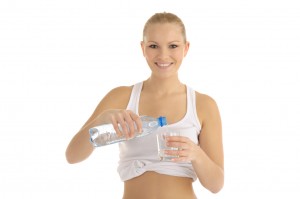
The average adult drinks about 1.5 litres of water per day, and that includes water used in drinks such as coffee, tea and juice. -Health Canada
There is hardly another food essential with as many brands and grades as water. This makes the selection difficult. Depending on its ingredients, it helps to strengthen the muscles, bones, the heart, nerves, digestion or the stomach. Here are some answers to the most important questions about healthy water.
Is there such a thing as the ideal Drinking Water?
Whether it comes from a mountain stream, your kitchen tap, or a plastic bottle, water is something you can’t live without. There are about 70 domestic brands of Canadian Bottled Water. And Canadians love their bottled water. But there is actually no such thing as the ideal spring water. Rather, it is a question of what qualities in the water you need, only then can you chose the “right” water for yourself.
If you are into sports, or if digestion is a problem, then your water should have lots of magnesium in it. If you need water for small children, then it should not contain any sodium and just a little nitrate. (Nitrate seeps into the ground water by over fertilization and is dangerous for babies). Those who are at risk of osteoporosis should choose a water with lots of calcium in it. You need to read the label if you want to find the water best suited for you. It will tell you the ingredients and in the case of healing water, its applications.
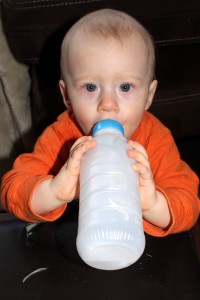
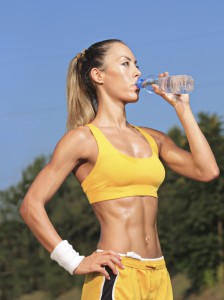
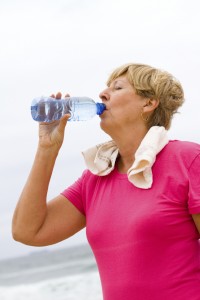
Drinking water should satisfy different requirements:
For seniors who are lactose-intolerant, it contributes to their calcium supply.
For small children it should be low sodium.
An athlete needs it as a source of magnesium.
Aren’t we getting enough minerals through our foods?
That depends on the mineral. Iodine, for example, is a mineral that is in really short supply. When it comes to calcium, 46 % of men and 51 % of women do not reach the daily recommended amount.
Is there no other food that would be a better source of minerals? Milk and milk products, for example, are an ideal source of calcium. However, not everyone can tolerate them and some just don’t like them. This is an example where drinking water can fill a void. In addition, mineral water contains a number of minerals all at once. This too can compensate for deficiencies.
Is Spring Water healthy?
Generally, spring water is healthy. And this the more so, the more polluted our drinking water from the tap is. Spring water is generally obtained from great depths. Contaminants from farming such as nitrates, pesticides (pest control products) or uranium (from phosphate containing plant food) have generally not penetrated as far as there. Depending on the quality of your tap water at home, you can avoid a great deal of contaminants this way. Also: Depending on the origin of the spring water, a good supply of minerals is given so that you are doubly supplying yourself with good quality.
Is bottled Water regulated in Canada?
Yes, it is, under the Food and Drugs Act and Regulations as a food product. This Act creates identity standards, provides a basis for labeling requirements and establishes the safety parameters for bottled water and all other food products. Manufacturers and importers of bottled water are inspected and monitored by the Canadian Food Inspection Agency (CFIA) to help ensure that the products are safe and wholesome.
Canadian bottled water companies must also adhere to provincial regulations when taking water at source. Some provincial governments are reviewing their water and environment regulations to improve water management. Each province has the authority to regulate its own water standards which are based on national guidelines for Canadian drinking water quality. These guidelines are published under the auspices of the Federal-Provincial-Territorial Committee on Drinking Water, composed of representatives from all provinces, the Yukon, Northwest Territories and Nunavut, Health Canada and Environment Canada. Health Canada acts as Secretariat to the Committee and as such prepares the technical documents which are reviewed by committee members. The guidelines can be viewed at the following website: http://www.hc-sc.gc.ca/ewh-semt/water-eau/drink-potab/guide/index-eng.php
In addition, companies which are members of the Canadian Bottled Water Association (CBWA) must adhere to standards set by the industry including an annual unannounced plant inspection which involves audits of product quality and plant operations.
The Canadian bottled water industry has been involved in implementing a Hazard Analysis Critical Control Point (HACCP) system which was funded by Agriculture and Agri-Food Canada’s Canadian Food Safety and Quality Program (CFSQ). HACCP is an internationally recognized system in which critical points in a process are identified and controls are put into place to ensure food safety hazards are eliminated.
Water – some Product Information
Mineral water is a natural product obtained from underground water resources. Bottled water containing not less than 250 parts per million total dissolved solids may be labeled as mineral water. Mineral water is distinguished from other types of bottled water by its constant level and relative proportions of mineral and trace elements at the point of emergence from the source. No minerals can be added to this product.
If the total dissolved solids (TDS) content of mineral water is below 500 ppm, or it is greater than 1,500 ppm, the statement “low mineral content” or “high mineral content,” respectively, must appear on the principal display panel. If the TDS of mineral water is between 500 and 1,500 ppm, no additional statements are needed. Note: this is in contrast to the European definition, where all Natural Spring Waters with a TDS of 0 to 500 mg/liter are considered Mineral with Low Mineral Content (or just mineral waters).
The mineral content can vary substantially from spring to spring.
Spring water is also obtained from subterranean water resources and needs to be bottled right at the source. This water is not demineralized, which keeps all of the water’s natural minerals in place. It does not need to show original purity and does not need to be officially recognized as such. Often it contains less minerals than mineral water and the controls are not as tight.
Table water need not be of natural origin. It is an artificial mixture of tap water and other ingredients such as salt water or mineral water. Since table water is not bound to a specific spring it may be produced and bottled anywhere. It also may be sold “loosely”, meaning out of dispensers and such. Contrary to mineral water, it does not require the seal of official approval.
Healing water is like mineral water, but it has a special composition that makes for a healing, palliating and preventative action. Food and beverage products are permitted to make a function claim when used under the specific conditions set out in Table 8-2 of the CFIA’s Guide to Food Labelling and Advertising (GFLA). Function claims are claims about the specific beneficial effects that the consumption of the food or a constituent of the food (i.e. nutrient or other component) has on normal functions or biological activities of the body.
Do we need to watch the Sodium Content in Water?
By sodium we generally mean salt. It consists of sodium and sodium chloride (NaCl), which become separated in the water.
A person’s level of exertion largely determines his or her daily requirement of sodium. Normally about three grams are necessary, but severe physical stress can bring the requirement up to fifteen grams or more. The heart’s metabolism is affected by sodium, as is the regular contraction of the heart. Today, we rarely have to worry about sodium deficiency: Salt is an integral part of many foods, especially those that are highly processed.
Some persons –who are sensitive to salt – react to salt with increased blood pressure, but not all. Particularly the elderly have been warned about excessive sodium consumption. But this is controversial today and some even suffered from a lack of sodium. Therefore, it is generally not necessary to abandon salt completely. Sodium in bottled water ranges from 10 mg/l in most bottled waters to 1,200 mg/l in a few waters, such as Vichy Catalan and Vichy Célestins.
Should we all just drink Mineral Water, and what about regular tap water?
Whether or not mineral water should be preferred over tap water depends to a certain degree on the amount of contaminants contained in the different tap waters, as well as each person’s individual requirements of particular minerals.
According to the Berkley Springs International Water Tasting 22nd annual competition in West Virginia in 2012, Greenwood, B.C, residents can now say they have the best tap water in the world. It won top prize: the coveted title of Best Municipal Water in the World with a score of 40 out of 44. The water is judged on appearance (5 points), odour (5 points), flavour (10 points, mouth feel (5 points), aftertaste (5 points) and overall impressions (14 points).
The community’s drinking water comes from underground aquifers and is untreated.
The tap water in Munich, Germany, has excellent quality too. In this case, a resourceful manager of the public utility ensured already years ago, that it is not derived from Munich’s subsoil and that the drainage area of the water is converted to organic farming. This ensures a low nitrate and pesticide content right from the start.
As well, water rich in calcium or magnesium may be recommendable for some people.
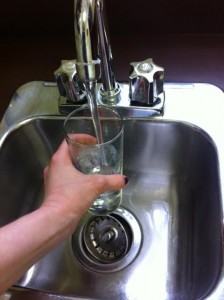
In many municipalities, the quality of tap water is excellent and can be safely consumed
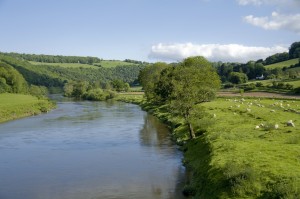
In order to ensure the high quality of Munich’s drinking water, the public utility in Munich has been promoting organic farming in Mangfalltal since 1992.
What about Alkaline Water?
Drinking alkaline water on a regular basis is a great way to address over-acidity, and for this reason I recommend it to almost everyone. Having an acid terrain invites disease into your body, but if you are alkaline, then ailments, bugs or viruses have a hard time manifesting. With today’s fast food diet, lack of exercise and stress levels that lower our pH levels, it is not surprising that most of us are indeed over-acid.
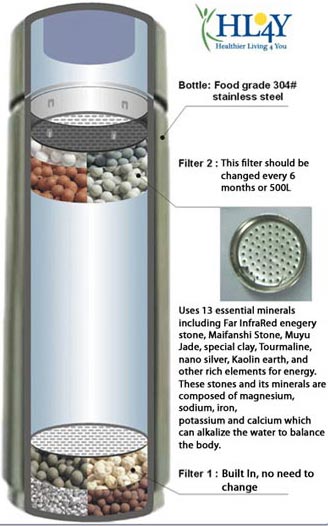
A new breakthrough in nanotechnology that combines the healing wonders of mineral stones and the life-giving elements of Alkaline Water. AlkaMate – provides bottled alkaline water and has micro-electrolytic properties that raise the pH level in drinking water…
The AlkaMate and AlkaPitchers are available right here at our clinic.
Regular: $ 60.00 + HST
April Special: $ 45.00 + HST
“If someone were to ask me, what is the one thing I can do to have better health? The answer would be very simple, ‘Start Drinking Alkalized Water’”
Dr. Robert Young – Author of the pH Miracle
Up until not too long ago, the recommended daily consumption was 1.5 to 2.5 litres per day. This turned out to be wrong. 1.5 litres daily are enough – in addition to the water content in food. And we are definitely allowed to follow our sensation of thirst – it is only in the elderly where this often fails. In this case, it’s best to have a glass of water close-by at all times, so that you don’t forget!How much should we drink anyways?
People with complaints of the heart and kidneys, however, should not drink excessively. Because too much fluid can burden their systems.
Who should drink what?
It is important to read the label. Thus, when there are complaints of the stomach, a mineral water high in Bicarbonate – HC03, is recommendable. Present in all biological fluids, bicarbonate is essential for maintaining our bodies’ pH balance. The substance is also found in stomach secretions. Lactic acid generated by physical activity is neutralized by bicarbonate dissolved in water; a similar process raises the pH of some acidic foods. The typical range for bicarbonate in bottled water is 50 to 200 mg/l, but it can reach up to about 1,800 mg/l in waters such as Apollinaris, Gerolsteiner, and Borsec.
If you need calcium, then look for bottled water has about 500 mg/l of calcium in it, as most will have less than 100 mg/l. Adults need about eight hundred milligrams of calcium per day–babies don’t require as much, but fifteen to nineteen year olds need significantly more. The many benefits of calcium include its stabilizing of bone structure, teeth, and cell membranes; ensuring nerve and muscle impulses are properly transmitted; and helping to prevent blood clotting. Calcium also has a balancing effect for numerous skin allergies. Bones decalcify (osteoporosis) and fractures become more likely if a body is not getting enough calcium.
The waters best suited for your nerves are those with a high potassium content (potassium in mg/l). Typical potassium content in bottled water is less than 5 mg/l, but some (such as Ferrarelle and Malvella) can have as much as 50 mg/l. Two to four grams is usually a sufficient day’s supply of potassium. Children and young people should pay particular attention to their intake, since potassium aides the growth of cells. The pressure of water between cells is regulated by potassium, which also makes sure each cell gets enough food. Potassium has special roles to play in muscle contraction and the formation and conduction of impulses of the heart. Potassium deficiency can weaken skeletal muscles and make smooth muscles tired.
The best waters for the muscles are mineral waters rich in magnesium. Almost all human cells have some level of magnesium in them, and adults need three to four hundred milligrams of magnesium every day. Magnesium is important for the regulation of muscle contractions and the transmission of nerve impulses, and it activates energy-producing enzymes. Bone structure also relies on magnesium, and it expands blood vessels, which lessens the risk of heart attack. Nervousness, lack of concentration, dizziness, and headaches or migraines may result from magnesium deficiency. Most bottled waters have below 20 mg/l of magnesium, though some may have as much as 1000 mg/l.
If you are constipated, then you may prefer water rich in sulfates. Sulfates are the salts of sulfur. They aid the liver in detoxification and help digestion by stimulating the gall bladder. Sulfates in high doses act as a laxative. Fish, meat, and milk contain sulfates, which are an important component of protein. The human body only absorbs small amounts of sulfates, but these amounts are sufficient to stimulate peristalsis by binding magnesium and sodium to water in the intestine. This effect makes mineral waters rich in sulfates, which taste slightly bitter, suitable as “non-alcoholic bitters” after a meal. Most bottled waters have well below 100 mg/l of sulfates, but San Pellegrino and a few others can reach 500 mg/l.
Most adults need between twenty and thirty milligrams of silica daily. [An essential mineral building block, silica is one of the body’s greatest energizing nutrients.] Silica reduces the risk of heart disease and may prevent osteoporosis; it also helps tissue repair by serving as an antioxidant. Hair and nails are strengthened by silica. If bottled waters contain any silica, it’s usually less than 20 mg/l, and the higher levels in waters such as Fiji and Antipodes are well below 100 mg/l.
The more expensive the better?
There are also very reasonably priced mineral waters available that contain adequate amounts of minerals. A high price does not necessarily translate into the best quality. As mentioned before, it is important to read the label. Moreover, many mineral waters are marketed only locally and not all brands are available everywhere.
The mineral waters mentioned in this article feature high concentrations of a particular mineral. This can be used as a benchmark to find the ideal mineral water for you.
Glass or Plastic?
Glass is made from sand, not from petroleum or gas as is still the case with plastic. Glass is the only packaging material that does not interact with the food contained therein. It does not release any elements into the contents, which could alter taste or compromise health. It is unaffected by food, even in the case of acetic acid. It does not corrode either when stored for a very long time.
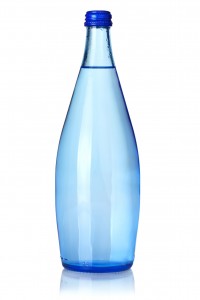
Some polyethylene terephthalate bottles can transfer harmful toxins from the plastic into the water. If you want to be sure, it is best to use glass bottles.
Nothing can evaporate through the glass, this includes the flavouring. It forms a complete barrier for fluids of all kinds. And it is impermeable for microorganism such as bacteria, viruses or fungi.
We don’t expect to be getting plastic in our mineral water from the bottle surrounding it. Using glass bottles instead will ensure that we don’t. Furthermore, reusable systems are environmentally friendly. Comparative studies between glass and other packaging materials in terms of protecting the environment did not show any advantages for the alternatives to glass. At least, not when they are marketed locally.
Of course, there are safety limits for contaminants in bottled water coming from the packaging. But whether or not they are low enough to not affect our health remains to be seen in future.
If you have any questions or comments about this article, homeopathy, or any other of our offered services and products, please contact us at (519) 603-0505 and we will be happy to talk to you. Or, to book an appointment, please call us or go online to www.kwhomeopathicmedicine.com.
Irene Schwens, DHMHS, C. Tran.
Owner / Homeopath, training and expertise in
Classical Homeopathy and Live Cell Microscopy








